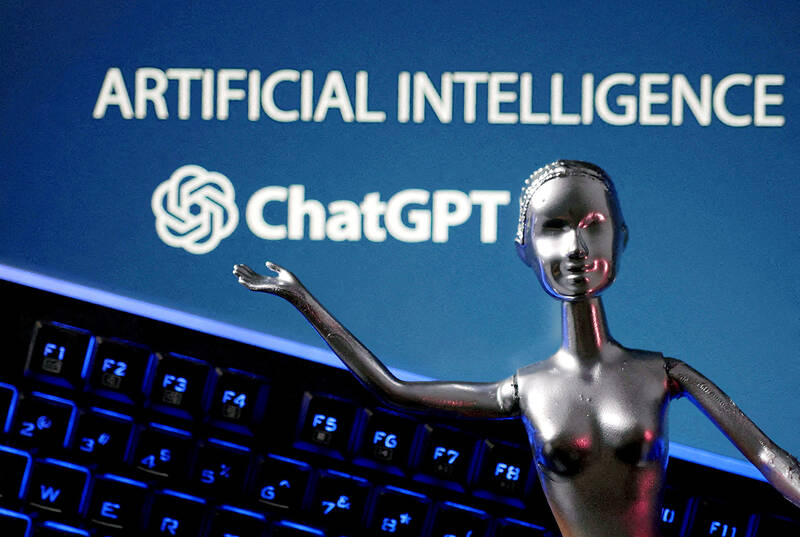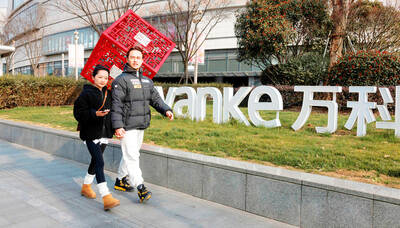Ever since poem-churning ChatGPT burst on the scene six months ago, expert Gary Marcus has voiced caution against artificial intelligence’s (AI) ultra-fast development and adoption.
However, against AI’s apocalyptic doomsayers, the New York University emeritus professor said in an interview that the technology’s existential threats could be “overblown.”
“I’m not personally that concerned about extinction risk, at least for now, because the scenarios are not that concrete,” Marcus said in San Francisco.

Photo: Reuters
“A more general problem that I am worried about ... is that we’re building AI systems that we don’t have very good control over and I think that poses a lot of risks, [but] maybe not literally existential,” he said.
Long before the advent of ChatGPT, Marcus designed his first AI program in high school — software to translate Latin into English — and after years of studying child psychology, he founded Geometric Intelligence, a machine learning company later acquired by Uber Technologies Inc.
In March, alarmed that ChatGPT creator OpenAI was releasing its latest and more powerful AI model with Microsoft Corp, Marcus signed an open letter with more than 1,000 people including Tesla Inc chief executive officer Elon Musk calling for a global pause in AI development.
However, last week he did not sign the more succinct statement by business leaders and specialists — including OpenAI founder Sam Altman — that caused a stir.
Global leaders should be working to reduce “the risk of extinction” from AI technology, the signatories said.
The one-line statement said that tackling the risks from AI should be “a global priority alongside other societal-scale risks such as pandemics and nuclear war.”
Signatories included those who are building systems with a view to achieving “general” AI, a technology that would hold the cognitive abilities on par with those of humans.
“If you really think there’s existential risk, why are you working on this at all? That’s a pretty fair question to ask,” Marcus said.
Instead of putting the focus on more far-fetched scenarios in which no one survives, society should be paying attention to where real dangers lie, Marcus said.
“People might try to manipulate the markets by using AI to cause all kinds of mayhem and then we might, for example, blame the Russians and say: ‘Look what they’ve done to our country,’ when the Russians actually weren’t involved,” he said.
“You [could] have this escalation that winds up in nuclear war or something like that. So I think there are scenarios where it was pretty serious. Extinction? I don’t know,” he said.
In the short term, Marcus is worried about democracy.
Generative AI software produces increasingly convincing fake photographs, and could soon produce videos, at little cost.
“Elections are going to be won by people who are better at spreading disinformation, and those people may change the rules and make it really difficult to have democracy proceed,” he said. “Democracy is premised on having reasonable information and making good decisions. If nobody knows what to believe, then how do you even proceed with democracy?”
The author of the book Rebooting AI does not think hope should be abandoned, as there is still "a lot of upside."
There is a chance that AI not yet invented could "help with science, with medicine, with elder care," Marcus said.
"But in the short term, I feel like we're just not ready. There's going to be some harm along the way and we really need to up our game, we have to figure out serious regulation," he said.
At a US Senate hearing last month, seated beside Altman, Marcus argued for the creation of a national or international agency responsible for AI governance.
The idea is backed by Altman, who has returned from a European tour in which he urged political leaders to find the "right balance" between safety and innovation.
However, beware of leaving the power to corporations, Marcus said.
"The last several months have been a real reminder that the big companies calling the shots here are not necessarily interested in the rest of us," he said.

CHIP RACE: Three years of overbroad export controls drove foreign competitors to pursue their own AI chips, and ‘cost US taxpayers billions of dollars,’ Nvidia said China has figured out the US strategy for allowing it to buy Nvidia Corp’s H200s and is rejecting the artificial intelligence (AI) chip in favor of domestically developed semiconductors, White House AI adviser David Sacks said, citing news reports. US President Donald Trump on Monday said that he would allow shipments of Nvidia’s H200 chips to China, part of an administration effort backed by Sacks to challenge Chinese tech champions such as Huawei Technologies Co (華為) by bringing US competition to their home market. On Friday, Sacks signaled that he was uncertain about whether that approach would work. “They’re rejecting our chips,” Sacks

Taiwan’s long-term economic competitiveness will hinge not only on national champions like Taiwan Semiconductor Manufacturing Co. (TSMC, 台積電) but also on the widespread adoption of artificial intelligence (AI) and other emerging technologies, a US-based scholar has said. At a lecture in Taipei on Tuesday, Jeffrey Ding, assistant professor of political science at the George Washington University and author of "Technology and the Rise of Great Powers," argued that historical experience shows that general-purpose technologies (GPTs) — such as electricity, computers and now AI — shape long-term economic advantages through their diffusion across the broader economy. "What really matters is not who pioneers

BUBBLE? Only a handful of companies are seeing rapid revenue growth and higher valuations, and it is not enough to call the AI trend a transformation, an analyst said Artificial intelligence (AI) is entering a more challenging phase next year as companies move beyond experimentation and begin demanding clear financial returns from a technology that has delivered big gains to only a small group of early adopters, PricewaterhouseCoopers (PwC) Taiwan said yesterday. Most organizations have been able to justify AI investments through cost recovery or modest efficiency gains, but few have achieved meaningful revenue growth or long-term competitive advantage, the consultancy said in its 2026 AI Business Predictions report. This growing performance gap is forcing executives to reconsider how AI is deployed across their organizations, it said. “Many companies

China Vanke Co (萬科), China’s last major developer to have so far avoided default amid an unprecedented property crisis, has been left with little time to keep debt failure at bay after creditors spurned its proposal to push back a looming bond payment. Once China’s biggest homebuilder by sales, Vanke failed to obtain sufficient support for its plan to delay paying the 2 billion yuan (US$283.51 million) note due today, a filing to the National Association of Financial Market Institutional Investors showed late on Saturday. The proposal, along with two others on the ballot, would have allowed a one-year extension. All three